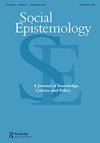为什么非洲会出现认识论的非殖民化?
IF 2
2区 哲学
Q1 HISTORY & PHILOSOPHY OF SCIENCE
引用次数: 0
摘要
本文章由计算机程序翻译,如有差异,请以英文原文为准。
Why Epistemic Decolonisation in Africa?
ABSTRACT The call to decolonise knowledge is gaining increasing popularity in African philosophy. But as scholarly attention to the topic intensifies, so do doubts about the usefulness of theorising it, especially in spaces – like Africa – that are riddled with deeper problems such as mass poverty and social disempowerment. I focus on three challenges that Bernard Matolino has recently issued. If these challenges are on the right track, they threaten to derail the whole project of epistemic decolonisation worldwide, since many of the aspects of Africa that Matolino thinks make decolonial theorising unhelpful are shared by the rest of the Global South. In this paper, I develop a conception of epistemic decolonisation that is geared to withstanding such doubts in the contemporary African context, and can hopefully serve others in the Global South who share some of Africa’s problems.
求助全文
通过发布文献求助,成功后即可免费获取论文全文。
去求助
来源期刊

Social Epistemology
Multiple-
CiteScore
2.60
自引率
17.60%
发文量
60
期刊介绍:
Social Epistemology provides a forum for philosophical and social scientific enquiry that incorporates the work of scholars from a variety of disciplines who share a concern with the production, assessment and validation of knowledge. The journal covers both empirical research into the origination and transmission of knowledge and normative considerations which arise as such research is implemented, serving as a guide for directing contemporary knowledge enterprises. Social Epistemology publishes "exchanges" which are the collective product of several contributors and take the form of critical syntheses, open peer commentaries interviews, applications, provocations, reviews and responses
 求助内容:
求助内容: 应助结果提醒方式:
应助结果提醒方式:


